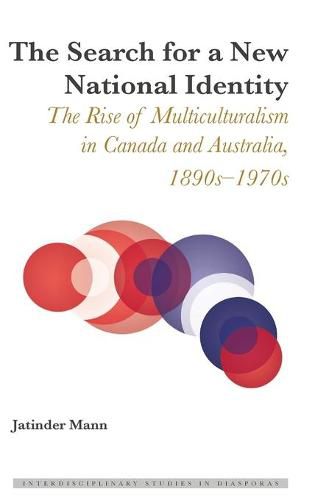Readings Newsletter
Become a Readings Member to make your shopping experience even easier.
Sign in or sign up for free!
You’re not far away from qualifying for FREE standard shipping within Australia
You’ve qualified for FREE standard shipping within Australia
The cart is loading…






This title is printed to order. This book may have been self-published. If so, we cannot guarantee the quality of the content. In the main most books will have gone through the editing process however some may not. We therefore suggest that you be aware of this before ordering this book. If in doubt check either the author or publisher’s details as we are unable to accept any returns unless they are faulty. Please contact us if you have any questions.
This book explores the profound social, cultural, and political changes that affected the way in which Canadians and Australians defined themselves as a people from the late nineteenth century to the 1970s. Taking as its central theme the way each country responded to the introduction of new migrants, the book asks a key historical question: why and how did multiculturalism replace Britishness as the defining idea of community for English-speaking Canada and Australia, and what does this say about their respective experiences of nationalism in the twentieth century? The book begins from a simple premise - namely, that the path towards the adoption of multiculturalism as the orthodox way of defining national community in English-speaking Canada and Australia in the latter half of the twentieth century was both uncertain and unsteady. It followed a period in which both nations had looked first and foremost to Britain to define their national self-image. In both nations, however, following the breakdown of their more formal and institutional ties to the ‘mother-country’ in the post-war period there was a crisis of national meaning, and policy makers and politicians moved quickly to fill the void with a new idea of the nation, one that was the very antithesis to the White, monolithic idea of Britishness. This book will be useful for both history and politics courses in Australia and Canada, as well as internationally.
$9.00 standard shipping within Australia
FREE standard shipping within Australia for orders over $100.00
Express & International shipping calculated at checkout
This title is printed to order. This book may have been self-published. If so, we cannot guarantee the quality of the content. In the main most books will have gone through the editing process however some may not. We therefore suggest that you be aware of this before ordering this book. If in doubt check either the author or publisher’s details as we are unable to accept any returns unless they are faulty. Please contact us if you have any questions.
This book explores the profound social, cultural, and political changes that affected the way in which Canadians and Australians defined themselves as a people from the late nineteenth century to the 1970s. Taking as its central theme the way each country responded to the introduction of new migrants, the book asks a key historical question: why and how did multiculturalism replace Britishness as the defining idea of community for English-speaking Canada and Australia, and what does this say about their respective experiences of nationalism in the twentieth century? The book begins from a simple premise - namely, that the path towards the adoption of multiculturalism as the orthodox way of defining national community in English-speaking Canada and Australia in the latter half of the twentieth century was both uncertain and unsteady. It followed a period in which both nations had looked first and foremost to Britain to define their national self-image. In both nations, however, following the breakdown of their more formal and institutional ties to the ‘mother-country’ in the post-war period there was a crisis of national meaning, and policy makers and politicians moved quickly to fill the void with a new idea of the nation, one that was the very antithesis to the White, monolithic idea of Britishness. This book will be useful for both history and politics courses in Australia and Canada, as well as internationally.